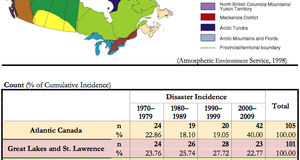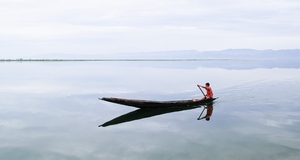Against Eco-Camp: Analyzing the Flaws of the Modern Climate Movement
By
2022, Vol. 14 No. 09 | pg. 1/1
IN THIS ARTICLE
KEYWORDS
AbstractThis interdisciplinary paper investigates the shortfalls and obstacles to success currently facing the climate movement, examining issues represented by the disconnect between policy and electoral politics, the hypocrisy and blatant indifference of nations and leaders, and the repeated exclusion of indigenous communities. These challenges are explored through the lens of camp, as defined by Susan Sontag in her seminal essay “Notes on Camp.” Susan Sontag’s descriptions in her essay were designed to more clearly articulate the behaviors, practices, ideas, and sentiments associated with the abstract concept of camp. Based on Susan Sontag’s description of camp and my research on the climate movement, I employ the use of “eco-camp” to identify specific areas of failure within the climate movement. The use of the term “eco-camp” seeks to acknowledge the ways that the definition of camp and the practices associated with the term have changed in the context of the climate movement. “Eco-camp” provides an important framework to evaluate the unique challenges facing the climate movement. This new perspective is of critical importance to understand the ways in which our society can instigate meaningful action against the existential threat of climate change. There are many four-letter words in the English language one should avoid uttering in daily conversation. For Susan Sontag, there was one four-letter word deserving of particular sensitivity: camp. Defined in Susan Sontag’s seminal essay “Notes on Camp,” camp places an emphasis on exaggeration, style over content, and the ostensibly serious (Sontag 261, 263, 267). Sontag felt that to discuss camp was an act of betrayal, pleading with readers to view her use of the term as an important act of “self-edification” (Sontag 261). The author of this paper takes this almost Fight Club-esque level of secrecy seriously, feeling compelled to break this vow of silence only out of alarm for the climate movement. There is a new specter haunting the global climate movement–the specter of eco-camp. The use of the term “eco-camp” stems from the traditional definition of camp and the dangerous ways in which the practices associated with the term have departed from Sontag’s original definition in the context of the climate movement, most notably in the idea of camp being decidedly apolitical and a contradiction of nature (Sontag 262, 264). Whether regarded as a symptom or a cause, eco-camp offers a means of identifying the flaws of the climate movement in the audacious hope of its edification. Act Not: The Death of Climate PolicyThe climate movement needs to consider the challenges associated with the lack of popular support for many potential policy solutions to the climate crisis. Democracy may die in darkness, but the daylight of electoral politics may prove fatal to instigating any meaningful climate policy (The Editorial Board). A recent Reuters poll found that an estimated 72% of Americans want the United States to “take aggressive action to slow global warming” (Kahn). Considering the vast amount of climate misinformation, the ardent attempts by certain domestic political parties to deny or downplay the severity of climate change, and the influence of many well-funded fossil fuel industry lobbyists, this statistic represents a rather optimistic take on the future of the climate movement. However, a closer examination of the data reveals some troubling contradictions. For instance, a CBS/YouGov poll found that 58% of Americans would be unwilling to take public transport to prevent climate change. (Backus). The same poll found that an estimated 70% of Americans would be unwilling to stop eating meat to stop climate change (Backus). This poll also found that most Americans are unsupportive of making financial sacrifices to prevent climate change, with 65% of Americans against higher taxes and 63% of Americans against higher utility bills (Backus).Eco-camp recognizes the paradox of society’s prevailing belief in climate change and the general unwillingness of many to make personal sacrifices for the climate, representing one of the fundamental policy challenges facing the climate movement. Sontag felt that “the essential element [of camp] is seriousness, a seriousness that fails” and that “…sincerity is not enough” because it can be considered akin to “intellectual narrowness” (Sontag 267, 273). The high percentage of support for drastic climate action demonstrates a true sincerity among the adherents of that movement, but a sincerity that appears detached from a determination to act. Sentiments about climate change cannot be taken seriously if the vast majority of society is against any of the policy proposals that could actually combat the problems associated with the climate crisis. Given this scenario, Sontag would seem vindicated in diagnosing empty sincerity, along with a form of intellectual narrowness, as it would seem readily apparent that a concern for the environment would naturally result in wanting to take some sort of action in support of the cause. The common explanation for the disconnect between strong public support for the climate movement and the decisive lack of will among the general public to take action against the issue involves an unfortunate mindset: hypocrisy. Climate Hypocrisy: Nations and LeadersDespite noble intentions, the climate movement has been plagued with a litany of incidents that expose a concerning amount of hypocrisy. A prime example of this hypocrisy can be found at the recent United Nations Climate Change Conference (COP26). This conference, which was organized by the United Kingdom and Italy, sought to bring together world leaders, businesses, citizens, and other valuable stakeholders in the fight against climate change (“What Is a COP?”). Even Queen Elizabeth II, who is notable for her lack of involvement in political issues, expressed concern over leaders who do not back up their promises with action, stating that “It's really irritating when they [leaders] talk, but they don't do" (Walker). These beliefs are indicative of the concern many feel regarding the hypocrisy present in the climate movement. For instance, it was reported that the Prime Minister of the United Kingdom, Boris Johnson, whose country helped organize COP26, opted out of more eco-friendly rail travel to fly on a private plane to attend the conference (Mason). During the conference Johnson told leaders of developing countries, “When it comes to tackling climate change, words without action, without deeds are absolutely pointless” (Mason). Cantankerous cranks like Prime Minister Johnson lecturing world leaders on the need to take action on climate change while deliberately choosing one of the most heavily polluting forms of transportation encapsulates the essence of those who excoriate the blatant hypocrisy of the climate movement. The actions of many nations participating in COP26 are also indicative of the broader concerns of hypocrisy. The United Nations recently published a report on global climate action that examined the progress that individual countries had made on their Nationally Determined Contributions (NDC), finding that many countries “were not on track to meet Paris Agreement goals” (“Climate Commitments Not on Track”). The Paris Agreement, signed in 2016 by 192 nations, was an international climate accord seeking to prevent a mean increase of global temperatures to less than 2 degrees Celsius and ideally under 1.5 degrees Celsius (Denchak). The United Nations report shows that many countries, despite agreeing to reduce emissions, have not actually followed through on their commitments (“Climate Commitments Not on Track”). Furthermore, the Paris Climate Accord contained a pledge from wealthy nations to provide $100 billion per year until 2023 to assist developing countries in preventing and adapting to climate change (Timperley). A Nature contributor estimates that “trillions of dollars will be needed each year” to meet the emissions targets of the Paris Climate Accords, meaning that the $100 billion of proposed funding is only a pittance compared to what is required to combat the threat of climate change (Timeperley). Saleemul Huq, Director of the International Centre for Climate Change and Development in Dhaka, believes that this smaller amount is “iconic in terms of the good faith of the countries that promised it” (Timperley). However, this $100 billion in climate aid was not made in good faith, as recent reports from the United Nations Organization for Economic Co-operation and Development (OECD) show that donor nations have consistently missed their funding pledges. For example, $58.5 billion was donated in 2016, $79.6 billion in 2019, and approximately $80 billion in 2020 to the climate fund for developing countries (Colchester). The widespread failure of countries to meet established emissions goals and the inability of developed countries to adequately assist developing countries in the fight against climate change represents the blatant hypocrisy allowing for such systemic failures in the global fight against climate change. Eco-camp acknowledges the hypocrisy inherent in elements of the climate movement, as many leaders turn to empty promises to simultaneously gain public support and maintain the status quo. Sontag felt that camp “introduces a new standard: artifice as an ideal” (Sontag 273). It seems that appearing to support climate initiatives without actually instigating change represents the path of least resistance for many leaders. It is exactly this focus on appearances that Sontag calls attention to, stating that camp represents a “consistently aesthetic experience of the world” and “incarnates a victory of style over content” (Sontag 272). World leaders understand that the content of a policy proposal will most likely only be scrutinized by a select group of academics, which will not have drastic implications for their political futures. What matters then is less about what a politician proposes to do about the climate crisis than how one looks while doing so. Sontag felt that to “perceive camp in objects and persons is to understand Being-as-Playing-a-Role” (Sontag 265). Leaders with the loudest voice, the most flamboyant gestures, and best strategic positioning will make the most headlines. See No Evil, Fear No Evil: Indifference in the Climate MovementHypocrisy may have infected the climate change movement, but it is plagued with an even deeper sickness: indifference. The climate movement’s goal to lower greenhouse gas emissions needs to be a global effort, as the mean temperature targets outlined in the Paris Climate Accord cannot be achieved without all countries working to reduce their emissions. It is important to note that each country has a varying degree of responsibility in this movement and that developing countries often have less economic ability to reduce emissions. However, this does not excuse behavior that seeks to actively prevent progress towards previously agreed emissions targets. During COP26, Chinese President Xi Jinping refused to show up in person for any portion of the conference and did not make any new emissions reduction pledges (Ni). This has alarmed many climate scientists because China is responsible for 28% of global carbon dioxide emissions, releasing almost 10.06 billion metric tons of carbon dioxide in 2018 alone (Blokhin). Even more concerning is the fact that 58% of China’s energy production is from burning coal, with more coal fired plants continuing to be built (Blokhin). Indian Environment Secretary R.P. Gupta made statements to the media during COP26 noting that India “announcing net zero [emissions] was not the solution to the climate crisis” (Miglani). India is the world’s third largest contributor to carbon dioxide emissions, responsible for emitting 7% of the world’s carbon dioxide or 2.65 billion metric tons (Blokhin). The use of coal to produce electricity has increased from “68% in 1992 to 75% in 2015” (Blokhin). While India achieving net zero emissions will not, on its own, be the solution in the fight against climate change, this fact does not absolve the country’s government of all responsibility. The United States, while currently making earnest attempts at reducing its climate emissions, also shares in the responsibility of the failures of the climate movement. In 2017, then President Trump decided to withdraw the United States from the Paris Climate Accord, representing the only country in the world to take such a poorly conceived policy position (Korte) While the United States is once again a signing member of the Paris Climate Accord, the country has only managed to achieve its climate emissions targets as a result of reduced activity during a global pandemic, which is hardly a ringing endorsement of its emissions mitigation efforts (Korte). Eco-camp notes the moral failings of countries that fail to take sufficient action against the climate crisis, seeking to put economic expansion over the health of their citizens. While a shift to more expensive forms of green energy may cause severe economic stress to developing countries, the pursuit of solely commercial endeavors without concern for the detrimental health effects of pollution is negligent at best and downright immoral at worst. Sontag views camp as “a solvent of morality” with the belief that it offers “a different—a supplementary—set of standards” to those who practice its sentiments (Sontag 271, 275). Such a supplementary set of standards appear to have informed China’s approach to pollution mitigation and green energy. For example, a study examining the health effects of pollution on Chinese residents published in Lancet Planetary Health, a peer-reviewed academic journal, found that air pollution “is associated with various chronic diseases, including stroke, ischemic heart disease, chronic obtrusive pulmonary disease (COPD), and lung cancer” and that this air pollution caused an estimated “1.24 million... deaths in China” in 2017 (Yin et. al.). The paper concluded by noting the clear need for more eco-friendly climate policies “to reduce the impact of air pollution on long-term economic development and population health” (Yin et. al.). Indigenous Communities: A Legacy of Exclusion in the Climate MovementThe climate movement has largely failed to respect the rights of its members most vulnerable to the effects of climate change. Indigenous communities have been repeatedly ignored or unrepresented in the climate movement. The frequency of these instances of neglect or exclusion is not merely a historical phenomenon, but a problem that persists at many major environmental events. For example, the organizers of COP26 effectively excluded many indigenous groups during major climate negotiations (Lakhani). Eriel Deranger, who serves as the executive director of Indigenous Climate Action, blasted COP26 organizer for “continuing to leave us out of the actual decision-making and positions of power” (Lakhani). Andrea Xieu, who serves as the spokesperson for the indigenous collective Futuros Indigenas, also lamented the fact that indigenous groups “were not part of the negotiations despite the fact that 80% of the planet’s biodiversity survives in our territories” (Lakhani). The exclusion of indigenous groups is particularly problematic, as these communities have been some of the most ardent defenders of environmental causes. In 2020, indigenous people represented half of the estimated 227 environmental and land defenders that were killed (Lakhani). Indigenous nations often represent the essence of sustainable living, bringing an unmatched knowledge and a culture that respects the earth. Subhankar Banerjee, a professor of Art and Ecology at the University of New Mexico, believes that there are “no easy answers, only creative accommodations” when working towards preserving biodiversity in the Global South (Banerjee). Specifically, Banerjee urges members of the climate movement to ensure that their proposals are “inclusive and justice-attentive” by practicing what is known as “varieties of environmentalism,” acknowledging the diverse situations, challenges and needs of the Global South (Banerjee). The exclusion of indigenous groups is a direct affront to the immense biodiversity of their land, the deaths of indigenous activists, and their knowledge of sustainable living practices Eco-camp imparts an awareness of the exclusion of indigenous activists in the climate movement as a result of colonialism that has been supported by the isolating nature of affluence. Sontag felt that camp is “…possible only in affluent societies, in societies or circles capable of experiencing the psychopathology of affluence” and that a “hallmark of Camp is the spirit of extravagance” (Sontag 267, 273). While the growth of the climate movement has contributed to its visibility, there are many climate activists who have never actually dealt with the impacts of climate change. For many underserved indigenous communities that are reliant on the earth’s ecosystem for their sustenance and cultural connection, climate change represents an existential threat. The current climate crisis disproportionally affects poor communities of color. Wealth has shielded many communities from the impacts of climate change and insulated many of the movement’s leaders from a necessary dialogue on the imperatives of including indigenous groups. Eco-camp itself could be considered an attitude that can only be accessed as a member of society’s class of intellectual elites, but it is important as a conduit of communication between groups that have not historically engaged in dialogue. Eco-Camp: Facing the FireAs a queer woman, Sontag was immersed in the vibrant gay culture and nightlife in California from the start of her undergraduate studies at the University of California, Berkeley (Dominguez). In one of her personal journals, Sontag writes that her “desire to write is connected with [her] homosexuality” which often made her “feel more vulnerable” (Dominguez). Thus, camp resulted from Sontag’s time inhabiting queer spaces and apparent need to write about a sentiment often attributed to queer communities. While Sontag does admit that some aspects of camp “offended” her, it is clear that her writing on this topic was not meant to critique or attack camp culture (Dominguez). Sontag’s writings on camp seem more focused on diagnosing a phenomenon than prescribing an intervention. Thus, eco-camp is not the solution to the climate crisis, but it does propose a lens through which to elucidate the issues facing the climate change movement. The problems posed by electoral politics, the hypocrisy of nations and leaders, outright indifference, or the exclusion of vulnerable indigenous communities are not new obstacles. However, it is imperative for members of the climate movement to face the heat of these failures to begin the necessary process of correcting them. Until then, the world burns. ReferencesBanerjee, Subhankar. “Bridge the North-South Divide for a UN Biodiversity Framework That Is More Just (Commentary).”Mongabay Environmental News, 7 Dec. 2021, news.mongabay.com/2021/09/bridge-the-north-south-divide-for-a-un-biodiversity-framework-that-is-more-just-commentary. Backus, Fred. “CBS News Poll – Eye on Earth: Americans Find Some Sacrifices Easier Than Others in Fighting Climate Change.”CBS News, 22 Apr. 2021, www.cbsnews.com/news/fighting-climate-change-opinion-poll-04-21-2021. Blokhin, Andriy. “The 5 Countries That Produce the Most Carbon Dioxide (CO2).”Investopedia, 2 Dec. 2021, www.investopedia.com/articles/investing/092915/5-countries-produce-most-carbon-dioxide-co2.asp. “Climate Commitments Not on Track to Meet Paris Agreement Goals as NDC Synthesis Report Is Published.”United Nations Climate Change, 26 Feb. 2021, unfccc.int/news/climate-commitments-not-on-track-to-meet-paris-agreement-goals-as-ndc-synthesis-report-is-published. Colchester, Max, and Matthew Dalton. “Rich Nations Lag Behind in Meeting $100 Billion Climate-Funding Pledge in Blow to COP26.”WSJ, 25 Oct. 2021, www.wsj.com/articles/rich-nations-lag-behind-in-meeting-100-billion-climate-funding-pledge-in-blow-to-cop26-11635184234. Denchak, Melissa. “Paris Climate Agreement: Everything You Need to Know.”NRDC, 19 Feb. 2021, www.nrdc.org/stories/paris-climate-agreement-everything-you-need-know. Dominguez, Alessa. “Susan Sontag’s Queer Life.”BuzzFeed News, 15 Sept. 2021, www.buzzfeednews.com/article/alessadominguez/susan-sontag-queer-lesbian-biography-benjamin-moser. The Editorial Board. “The Climate Summit to Nowhere.” WSJ, 30 Oct. 2021, www.wsj.com/amp/articles/the-climate-summit-to-nowhere-glasgow-cop26-joe-biden-11635543010?mod=opinion_lead_pos1. Kahn, Chris. “Most Americans Want ‘aggressive’ Action on Climate Change: Reuters/Ipsos Poll.”U.S., 6 June 2017, www.reuters.com/article/us-usa-climatechange-poll/most-americans-want-aggressive-action-on-climate-change-reuters-ipsos-poll-idUSKBN18X198. Korte, Cara. “What the U.S. Is Committing to as It Rejoins the Paris Climate Accords — and Why It Matters.”CBS News, 8 Mar. 2021, www.cbsnews.com/news/paris-agreement-united-states-commitment. Lakhani, Nina. “‘A Continuation of Colonialism’: Indigenous Activists Say Their Voices Are Missing at Cop26.”The Guardian, 4 Nov. 2021, www.theguardian.com/environment/2021/nov/02/cop26-indigenous-activists-climate-crisis. ---. “‘A Death Sentence’: Indigenous Climate Activists Denounce Cop26 Deal.”The Guardian, 16 Nov. 2021, www.theguardian.com/environment/2021/nov/16/indigenous-climate-activists-cop26-endangers-native-communities. Mason, Rowena. “Boris Johnson Will Travel Home from Cop26 by Private Plane.”The Guardian, 2 Nov. 2021, www.theguardian.com/politics/2021/nov/01/boris-johnson-will-travel-home-from-cop26-by-private-plane. Miglani, Sanjeev. “India Rejects Net Zero Carbon Emissions Target, Says Pathway More Important.”Reuters, 28 Oct. 2021, www.reuters.com/business/cop/india-says-net-zero-target-date-carbon-emissions-not-solution-2021-10-27. Ni, Vincent. “Xi Jinping Makes No Major Climate Pledges in Written Cop26 Address.”The Guardian, 1 Nov. 2021, www.theguardian.com/environment/2021/nov/01/cop26-xi-jinping-china-president-sidesteps-videolink-written-statement. Sontag, Susan.Against Interpretation: And Other Essays. 1st ed., Picador, 2001. Timperley, Jocelyn. “The Broken $100-Billion Promise of Climate Finance — and How to Fix It.”Nature, 20 Oct. 2021, www.nature.com/articles/d41586-021-02846-3?error=cookies_not_supported&code=21ee8ab3-8226-41af-98b6-a92a2e008c71. Walker, Ali. “Queen Slams ‘Irritating’ World Leaders Who Talk but Don’t Deliver on Climate Change.”POLITICO, 15 Oct. 2021, www.politico.eu/article/queen-slams-world-leaders-climate-change-cop26-glasgow. “What Is a COP?”UN Climate Change Conference (COP26) at the SEC – Glasgow 2021, 5 Nov. 2021, ukcop26.org/uk-presidency/what-is-a-cop. Yin, Peng, et al. “The Effect of Air Pollution on Deaths, Disease Burden, and Life Expectancy Across China and Its Provinces, 1990–2017: An Analysis for the Global Burden of Disease Study 2017.”Lancet Planetary Health, vol. 4, no. 9, 2020, pp. 386–98, www.thelancet.com/article/S2542-5196(20)30161-3/fulltext#articleInformation. Suggested Reading from Inquiries Journal
Inquiries Journal provides undergraduate and graduate students around the world a platform for the wide dissemination of academic work over a range of core disciplines. Representing the work of students from hundreds of institutions around the globe, Inquiries Journal's large database of academic articles is completely free. Learn more | Blog | Submit Latest in Political Science |


















